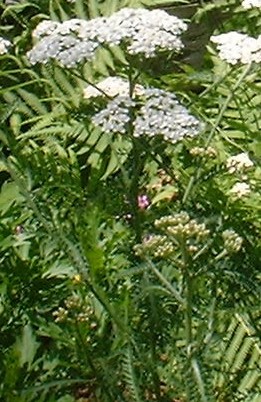|
Gardens Ablaze |
|||
|
|
Medicinal
Uses of Yarrow
|
||
|
Additional Yarrow Information
Growing Yarrow Site Map
Home |
Yarrow has been a well-known healing herb for centuries, though not enough studies have been done to credit or discredit the plant for some medicinal purposes. However, there is a long history of anecdotal use, at least some of which appears to be valid. The above-ground parts of Yarrow are the parts used medicinally, including the leaves, stems, and flowers. Harvesting for medicinal purposes should be done while the plant is in flower. Instructions for harvesting appear on the Main Yarrow Page. It appears that the white Yarrow (Achillea Millefolium) has the most potent medicinal benefit, though the newer plants with colored flowers do have the same basic but maybe slightly weaker medicinal characteristics. Taken internally as a tea, as with many herbs, Yarrow is believed to aid in digestion and possibly increase appetite. In case of common cold and fever, it causes the body to perspire, thereby eliminating toxins causing the illness. Yarrow is also believed to be a kidney and urinary tract cleanser because of its antiseptic properties, and may be useful for some liver problems. Undocumented traditional uses through history have also included relief from symptoms of stomach cramps, rheumatism, menstrual cramping, hypertension, flatulence, diarrhea, and as a general tonic. For external use, make a tea with the flower tops and use the resulting liquid for as an astringent for acne, skin toner and hair conditioner. Used for centuries on wounds, cuts, scrapes, rashes, and burns, the leaves and stems can be crushed and used on the spot to help stop bleeding and aid in healing. For hemorrhoids, add Yarrow to the bath for its soothing anti-inflammatory benefits. Contraindications: As with any herb, Yarrow should be avoided during pregnancy. It may also be an irritant for people allergic to plants from the Aster family. Otherwise, there are no known contraindications for use of preparations or fresh herb for medicinal purposes.
Custom Search
|
|
|
|
Gardens Ablaze |
|||

